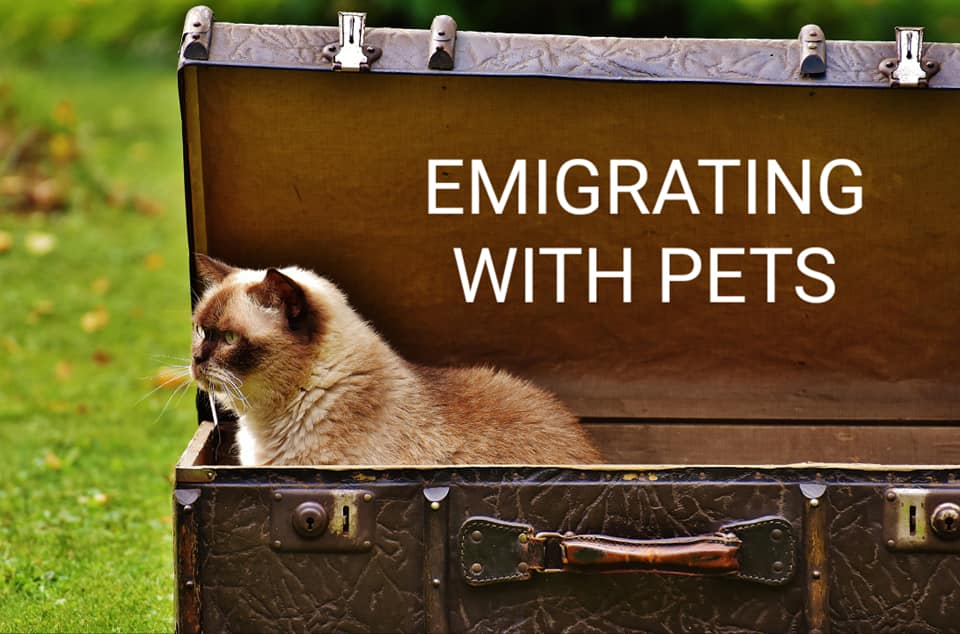
ANIMALS 101 – WHAT YOU NEED TO CONSIDER WHEN RELOCATING WITH YOUR PETS.
It is important to do your research well as there are steps to consider and cost to budget for. The regulations may differ between countries and you need to consider your pets early in the emigration process as it can easily take anything from 5-8 months.

THINGS TO CONSIDER
(Read the full article by )
- BREEDS
Unfortunately, some breeds are banned in certain countries, so double-check this in advance.
- PET PASSPORTS/VET CARDS
- TRAVEL CRATES/CAT CARRIERS
Buy safe and approved crates or cat carriers and start crate training immediately.
- REDUCING TRAVEL STRESS
Talk to a behaviourist and your veterinarian and prepare in advance.
- MICROCHIPPING
The microchips may differ between countries, but the 15-digit ISO compatible microchip is the world standard.
- BLOOD TESTS & PARASITE TREATMENT are required.
- VACCINATIONS
The following valid vaccinations are required and should reflect in the vet book/card and must be 30+ days old, but not more than 12 months old. Only accepted if done by a SAVC approved veterinarian.
- Rabies
- 3-in-1 for cats
- 5-in-1 for dogs
- Kennel cough is also recommended in some cases.
Also read: ANIMALS 101 – YOUR PET’S FINAL WALK – EUTHANASIA
- QUARANTINE
The quarantine periods and regulations differ from country to country.
- REHOMING
Those who emigrate without their pets put a massive burden on animal welfare organisations. Although there are exceptions, there are many people who just don’t want to spend the money, sadly.
Your emigration didn’t just happen overnight, so do not wait until the last minute to make arrangements for your pets. We get many owners who do a post of “urgent homes needed” or “need homes in 3 days”.
Never give them away for free or to anyone. Use reputable rescue organisations to rehome them and we really hope you have some sort of decency to make a proper donation to the ones taking over your responsibility.
Think before ever getting another pet whose life you are willing to disrupt or dispose of like an object.
We are pro-life, but if for some reason they can’t go due to health or very old age, please talk to your vet about euthanasia.
- GETTING HELP
You can also join groups like South Africans Emigrating with Pets and more. There are many agencies that can assist you.
A friend of mine and her family recently moved eight pets to a foreign country and had an awesome experience with Pets Abroad. Here are some of her thought & tips –
It’s more expensive than a vacation abroad but less expensive than University fees. You end up stressing far more than your pets will. That’s why many Veterinarians suggest calming tablets…..for humans. Although there are DIY options, the help of an agent is worth the fee! Creating Pet CV’s also helps significantly when trying to find pet-friendly accommodation. Put names and stories to your pets instead of just “six cats and two dogs.” The adjustment for our pets was easy and it was all worth it.
There might be other behavioural concerns to address with a behaviourist beforehand. Like travel, stress, adjustment, introduction to a new area, separation anxiety and being reunited with your pets abroad.
BEHAVIOURIST ADVICE ON THE REUNION (by Robyn Eshelby-Theart)
The singular thing that is most distressing (though we humans think otherwise) is loud, emotional greetings when reunited with our pets.
For most dogs, it is an injection of dopamine, feel-good chemicals, and it becomes something their bodies crave. This is why they suddenly become clingy and start doing things they didn’t do before, such as separation-related behaviour, reactivity/resource guarding behaviour towards other dogs and people, etc. They need that feeling, replicating how they felt in that moment. It is like a hit for them and it becomes their ultimate resource and reward.
For most cats, your voice at that moment stamps your voice as part of the distress. Cats process things differently. This fear can translate to hiding behaviours, or other antisocial/fearful behaviours not previously displayed, such as seeming afraid of their people, inappropriate elimination, or sudden aggression.
It is wonderful that you take your pets with you – but the ultimate gift is a calm, quiet, soothing greeting, and not one of the loud exclamations and crying and of kids clambering all over the pets. This should really be treated as any other moment on any other day.
Hats off and thank you to everyone who takes their responsibility and commitment to their pets seriously and includes them in your life plans. They are family and not just an object or commodities to dispose of when it is inconvenient.
Next week we will look at some pet insurance tips.
WHEN YOU KNOW BETTER, DO BETTER!